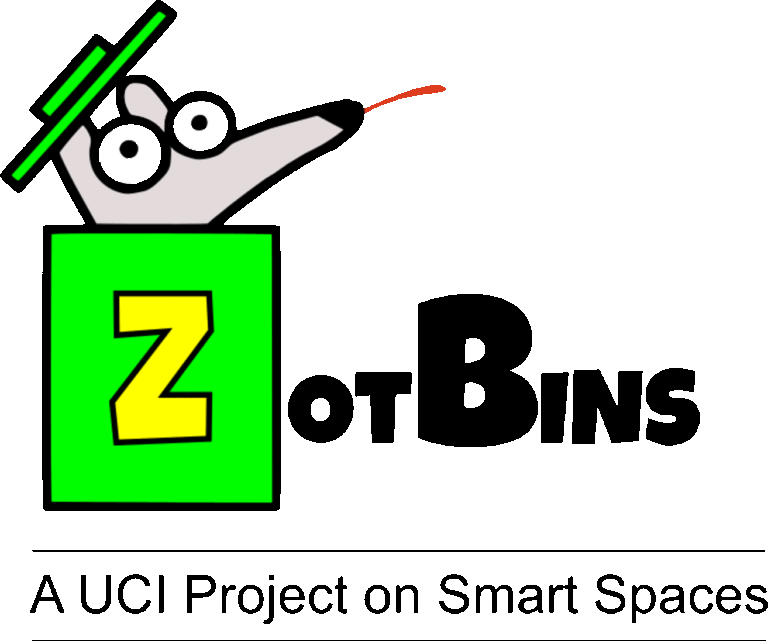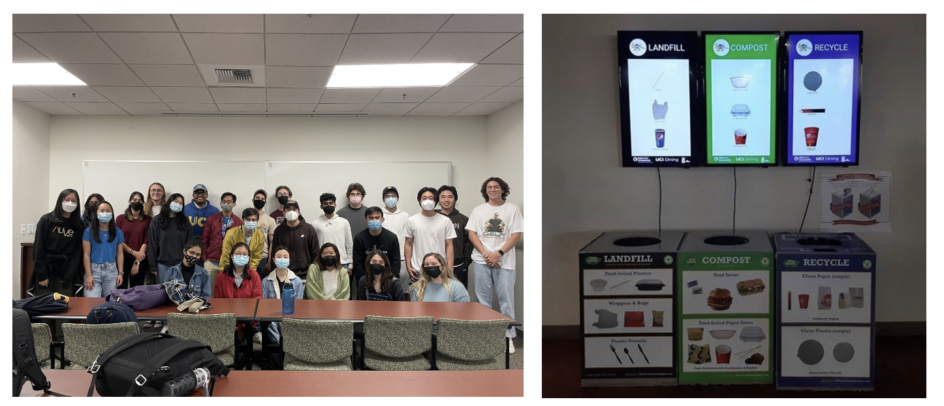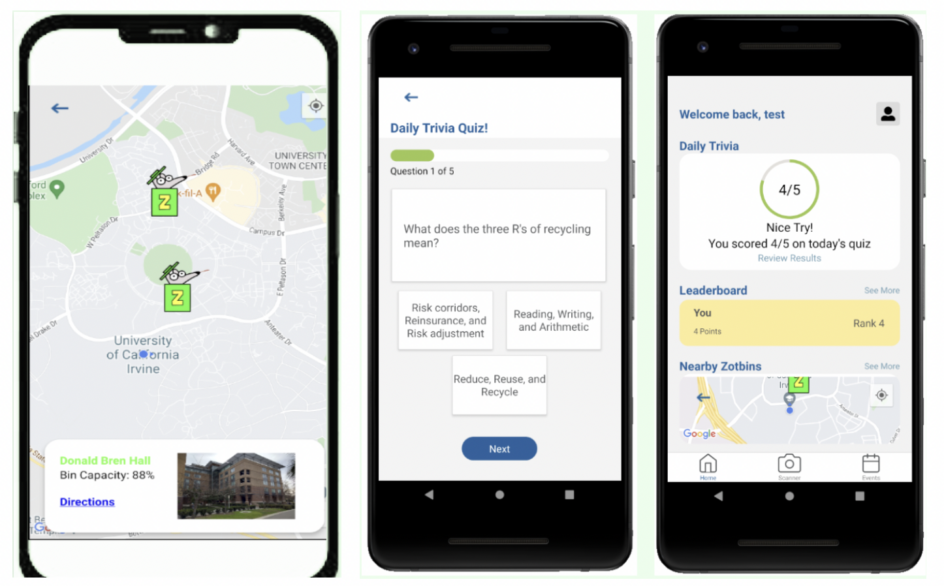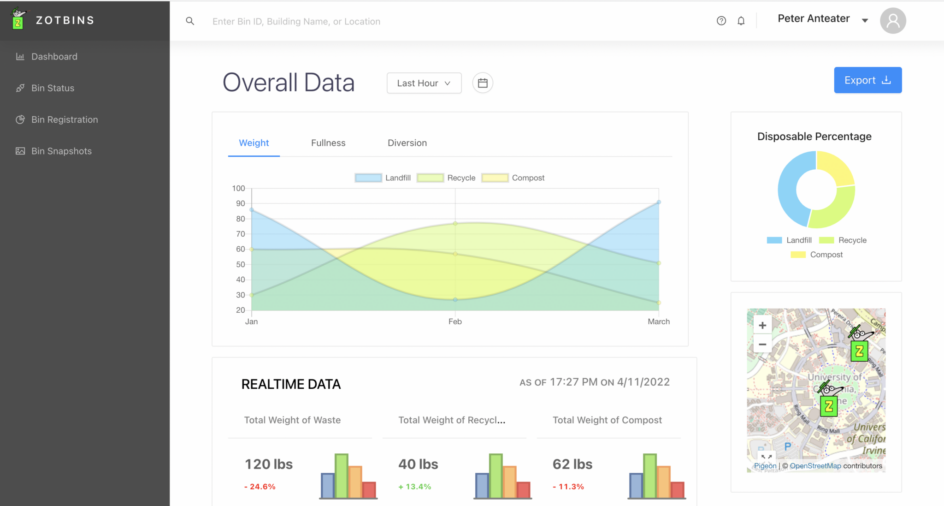The ZotBins Team Continues to Grow, Supporting UCI’s Move to Zero Waste

It has been five years since UCI hosted its first Internet of Things (IoT) Hackathon, organized through the TIPPERS (Testbed for IoT-based Privacy-Preserving PERvasive Spaces) project, a smart campus initiative originally funded by DARPA. It was there that four undergraduate students came up with the idea of ZotBins, a smart waste bin system that collects data to help make waste management more efficient. “The aim of the project was to create a tool to help with UCI’s zero waste initiatives,” says ZotBins co-founder Owen Yang, who graduated from UCI in 2020 and is now a software test engineer at Mainspring Energy. The project persists to this day, with new members applying their skills in support of technology-based zero waste management.
Keeping the ZotBins Mission Alive
At the start of 2020, the ZerO Waste Anteaters (ZOWA) team behind ZotBins, which had grown to 11 members, was celebrating the deployment of five ZotBins on campus — three in UCI’s West Food Court and two in Donald Bren Hall. At that point, although none of the UC campuses had reached their 2020 goal of achieving zero waste, UCI was leading the pack at 80%, and there was hope that ZotBins could help the university reach its target. Then the COVID-19 pandemic hit.
“2020 brought on many challenges with the start of the pandemic,” says computer science major Patrick Nguyen, who was a team lead at the time. “It was a big transition not only because the school went virtual, but because all of the founding members were graduating. Making that pivot in leadership was challenging.”
Now, two years later, that transition is finally in the rearview mirror. With campus life returning to normal and UCI still holding steady at an 80% waste diversion rate, ZOWA is ready to help push UCI to zero waste. The team has added three ZotBins to the East Food Court and has an app and other plans in the works for 2022.
“Since our struggles through the pandemic, we have now expanded to a team of 34 active members,” says electrical engineering major Brianna Hernandez. “We are excited to keep the ZotBins mission alive!”

The ZOWA Team
The ZOWA team is currently divided into subgroups: hardware and electrical, waste recognition, embedded systems, and web and mobile. This spring quarter, they also added an API [application programming interface] subgroup.
“We would like to continue developing the digital waste bins and integrating the work from each subgroup,” says electrical engineering major Andrea Su, who co-leads the hardware team with Hernandez. “By continuing to bring in new features such as our mobile app and by adding our waste classification model to the app, we further our goal to support zero waste efforts at UCI.”
The waste recognition team, led by computer science major Barry Gao, has been working on detecting and classifying the waste object based on images. “The waste objects are classified into 20-plus subcategories (e.g., bottles, utensils, napkins, etc.) and then mapped to three waste classification categories (recycle, landfill, compost),” he says. “We are cooperating with UCI Dining to collect daily waste images.”

The embedded systems team has been working on redesigning the digital waste bin to make the system cheaper and more robust than the previous version. “We want to make our system adaptable and expandable as we continue growing,” says Nguyen.
The web and mobile team has been collaborating with UCI Dining on a ZotZero app. “ZotZero started as a simple application with the feature of locating nearby bins,” says computer science major Sakshi Patil. “The team went on to develop and integrate more features like a waste classifying feature based on the barcodes of the item, a zero waste quiz for users, and access to events held by UCI Dining.” The app, which aims to help create more awareness around zero waste goals, should be available by the end of the year.

“Through our web application, we’re not only trying to generate analytics on the waste data we collect,” adds Patil, “but we also want to enable users to export the data we collect so they can create interesting applications based on the generated waste information.”

Although the API group is just getting started, they already have big goals in mind as well. “By the end of this quarter, we hope to finish local development of our ZotBins Lambda project and deploy it on Amazon Web Services to service our future applications,” says computer science major Justin Yue, who is leading the new group. “Concurrently, we will further develop an IoT-Sity research project we started in summer 2021 involving relevancy machine learning, which will navigate users to the nearest, appropriate ZotBins.” Specifically, the algorithm they’re developing will use contextual information, such as daily route and smart bin status, to optimize recommendations, sending a user to a smart bin that is not full and close to their daily route instead of to a bin that is close but almost full.
How to Get Involved
“I would never have guessed that our small investment in organizing a hackathon for smart campus applications would result in a movement that has now seen participation from several batches of our students who have all remained connected and involved with UCI and ZOWA, even as they have advanced into their careers,” says Chancellor’s Professor Sharad Mehrotra of the Donald Bren School of Information and Computer Sciences (ICS), who serves as the advisor to the group. “It is indeed a privilege to see a group of students self-organize and use the skills they are learning in classrooms toward a social cause that has become their passion. What is equally special about ZOWA is its policy to be open to students of all backgrounds and skills and to provide a nurturing environment for all to learn from each other.”
If you are interested in joining the ZOWA team and learning more about technology-based zero waste management, you can check out their Instagram account or send an email to ZotBinsUCI@gmail.com. Earth Day is the perfect time to start applying your tech skills to help UCI meet its sustainability goals!
— Shani Murray